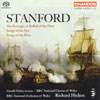Stanford Songs of the Sea; The Revenge; Songs of the Fleet
An out-and-out winner, with Finley on top form – heartily recommended!
View record and artist detailsRecord and Artist Details
Composer or Director: Charles Villiers Stanford
Label: Chandos
Magazine Review Date: 7/2006
Media Format: Super Audio CD
Media Runtime: 70
Mastering:
Stereo
DDD
Catalogue Number: CHSA5043

Tracks:
| Composition | Artist Credit |
|---|---|
| Songs of the Fleet |
Charles Villiers Stanford, Composer
BBC National Chorus of Wales BBC National Orchestra of Wales Charles Villiers Stanford, Composer Gerald Finley, Baritone Richard Hickox, Conductor |
| Songs of the Sea |
Charles Villiers Stanford, Composer
BBC National Chorus of Wales BBC National Orchestra of Wales Charles Villiers Stanford, Composer Gerald Finley, Baritone Richard Hickox, Conductor |
| (The) Revenge: a Ballad of the Fleet |
Charles Villiers Stanford, Composer
BBC National Chorus of Wales BBC National Orchestra of Wales Charles Villiers Stanford, Composer Richard Hickox, Conductor |
Author: Andrew Achenbach
Two of Stanford’s catchiest and most popular settings frame his 1904 Songs of the Sea for baritone, male chorus and orchestra: both ‘Drake’s Drum’ and ‘The Old Superb’ are instantly memorable and have alone justly secured the work’s survival. But there’s some terrific music tucked away in the three remaining numbers, not least the marvellously serene ‘Homeward Bound’ with its burnished orchestral palette (Stanford’s skilful scoring gives enormous pleasure throughout, in fact), rapt eloquence (nowhere more potent than at the line ‘Swiftly the great ship glides’) and adventurous harmonic scope (within the first couple of minutes the music travels from D flat to its furthest remove of G).
Six years later, Stanford returned to Henry Newbolt’s maritime verse to pen a more reflective sequel entitled Songs of the Fleet. Its spacious centrepiece, ‘The Middle Watch’, evokes a dusky mystery and sense of awe, while the opening ‘Sailing at Dawn’ is a gloriously assured and noble essay worthy of Elgar himself. In both sets, Gerald Finley’s firmly focused, ringing tone is a joy. He doens’t possess the salty tang of Benjamin Luxon (a true sea-dog if ever I heard one), but the voice is steadier and he sings with unfailing ardour, intelligence and sensitivity. Hickox and his BBC Welsh forces provide exemplary support.
I’m less smitten by the 1886 choral ballad The Revenge, one of the composer’s biggest early successes. Tennyson’s poem depicts how Sir Richard Grenville and his Devonian crew aboard Revenge (Drake’s favourite vessel) took on – and inflicted terrible damage upon – the Spanish fleet off the Azores in 1591 (one ship against 53 – I kid you not!). Stanford’s breezy setting proved a hit with Victorian choral societies up and down the land. Though no forgotten masterpiece, it’s most ably served by Hickox and company. Throw in an admirable booklet-essay by Jeremy Dibble and ripe, airy sound from Chandos, and it certainly adds up to a hearty recommendation.
Six years later, Stanford returned to Henry Newbolt’s maritime verse to pen a more reflective sequel entitled Songs of the Fleet. Its spacious centrepiece, ‘The Middle Watch’, evokes a dusky mystery and sense of awe, while the opening ‘Sailing at Dawn’ is a gloriously assured and noble essay worthy of Elgar himself. In both sets, Gerald Finley’s firmly focused, ringing tone is a joy. He doens’t possess the salty tang of Benjamin Luxon (a true sea-dog if ever I heard one), but the voice is steadier and he sings with unfailing ardour, intelligence and sensitivity. Hickox and his BBC Welsh forces provide exemplary support.
I’m less smitten by the 1886 choral ballad The Revenge, one of the composer’s biggest early successes. Tennyson’s poem depicts how Sir Richard Grenville and his Devonian crew aboard Revenge (Drake’s favourite vessel) took on – and inflicted terrible damage upon – the Spanish fleet off the Azores in 1591 (one ship against 53 – I kid you not!). Stanford’s breezy setting proved a hit with Victorian choral societies up and down the land. Though no forgotten masterpiece, it’s most ably served by Hickox and company. Throw in an admirable booklet-essay by Jeremy Dibble and ripe, airy sound from Chandos, and it certainly adds up to a hearty recommendation.
Discover the world's largest classical music catalogue with Presto Music.

Gramophone Digital Club
- Digital Edition
- Digital Archive
- Reviews Database
- Full website access
From £8.75 / month
Subscribe
Gramophone Full Club
- Print Edition
- Digital Edition
- Digital Archive
- Reviews Database
- Full website access
From £11.00 / month
Subscribe
If you are a library, university or other organisation that would be interested in an institutional subscription to Gramophone please click here for further information.




